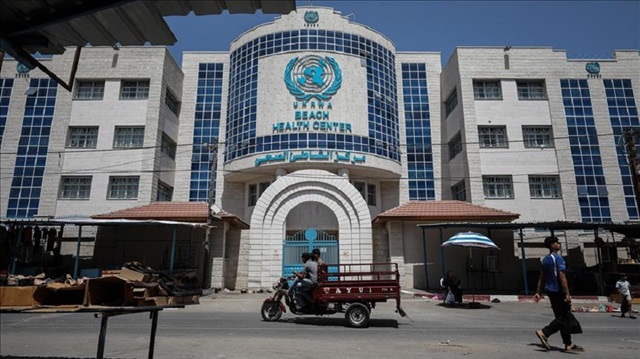
Bill seeks to limit US funding for UN’s Palestine refugee agency to resettlement of 1948 refugees
A bill winding its way through Congress could have significant blowback for the U.S. should it become law, a western diplomat has warned.
The proposed legislation introduced by Republican Representative Doug Lamborn seeks to limit U.S. funding for the United Nations Relief and Works Agency for Palestine Refugees (UNRWA) to solely fund the resettlement of refugees from the 1948 Arab-Israeli war.
The conflict created over 700,000 Palestinian refugees who fled or were forced from their homes.
It is unclear how many original Palestinian refugees are still alive from the conflict, and how many have not yet been resettled.
Additional waves of refugees have been created by subsequent conflicts, including the 1967 war, and UNRWA has been providing services to them and their descendants who in many cases live in legal limbo in camps throughout the region.
Should it become law, the legislation would halt Washington’s funding for the bulk of UNRWA’s activities, which include schooling, food, health services and microfinance for the 5.3 million refugees and internally displaced people it aids.
The bill, which is currently being considered by the House Foreign Affairs Committee, alleges UNRWA has artificially inflated the number of Palestinian refugees and “provides aid to those they define as Palestinian refugees until there is a solution they deem acceptable to the Israeli-Palestinian conflict.”
UNRWA spokesman Chris Gunness declined to comment on internal American legislation when contacted by Anadolu Agency, as did the State Department.
The Palestinian Ma'an News Agency reported that the bill is a U.S. attempt to recognize only 40,000 Palestinian refugees.
This is not the first time Congress sought to discount the agency's count of Palestinian refugees. A previous attempt in 2012 to limit the U.S.'s recognition of refugees to those who fled in 1948 and 1967 was met with fierce resistance by the State Department.
- 'Shifting responsilities'
The effort, former Deputy Secretary of State for Management and Resources Thomas Nides said in a since leaked letter to Congress "would put at risk the humanitarian needs of this large, poor and vulnerable refugee group.
"United States policy has been consistent for decades, in both Republican and Democratic administrations — final status issues can and must only be resolved between Israelis and Palestinians in direct negotiations. The Department of State cannot support legislation which would force the United States to make a public judgment on the number and status of Palestinian refugees," Nides wrote.
Under international law the children of refugees, whether or not the parents are stateless or lacking citizenship in another country, should also be considered refugees.
A western diplomat who spoke on condition of anonymity because he was not authorized to discuss the matter publicly maintained “there is nothing special” about the way in which UNRWA conducts its refugee tally, and warned that shifting UNRWA’s responsibilities to the UN’s main refugee agency, UNHCR, could actually result in inflating the figure.
UNHCR registers “children through both the male and the female line. UNRWA only registers refugees through the male line,” the diplomat told Anadolu Agency. “So if you were to have this population all administered through UNHCR the number of Palestine refugees would actually increase significantly.”
In general refugees typically have three choices they can pursue for resettlement: integration in a country that is hosting them, resettlement in a third country, or repatriation back to their home country, commonly referred to as the right of return.
Resettlement in a host country has been a challenging prospect for many Palestinians who remain in the Middle East, particularly those in Lebanon with its delicate sectarian balances.
And Israel and its allies in Congress have steadfastly ruled out the right of return for fear of the demographic repercussions it would carry for Israeli society.
“Be very careful what you wish for, because for UNHCR the preferred priority or choice would be for refugees to go back home, which is not something I suppose these American congresspeople would want,” the diplomat said.
- UNHCR’s record on resettlement
UNRWA has consistently declined to take a position on how refugees should be resettled, insisting the matter should be determined by the parties as a matter of peace talks in line with international law.
The diplomat warned that the number of refugees UNHCR has been able to resettle “is very, very small.
“This idea that you can just give the refugees to UNHCR, and they’ll magically resettle them … UNHCR’s record on that does not bear this out,” he said.
The bill claims “the number of refugees from other conflicts has diminished dramatically through UNHCR.”
But by UNHCR’s own count there were 17.2 million refugees in 2016, and less than 1 percent were resettled that year in part because only a small number of countries take part in its resettlement program.
Amid the push to wind down U.S. funding for UNRWA, the UN’s Palestine refugee agency is facing a funding shortfall prompted by the Trump administration’s decision in January to abruptly halt over half of a $125 million funding installment.
The U.S. has long been by far UNRWA’s largest funder, most recently allocating roughly $365 million for the agency annually.
Following the U.S. decision to freeze a large portion of its funding UNRWA has grappled with a budget crisis that could upend its operations, including the schooling it provides for roughly half a million Palestinians.
“The name of the game now is to save our schools,” Gunness, the UN spokesman said. “At the moment we don’t have enough money to open our schools at the beginning of the school year at the end of August. That’s the big priority for us, to save the school year.”




